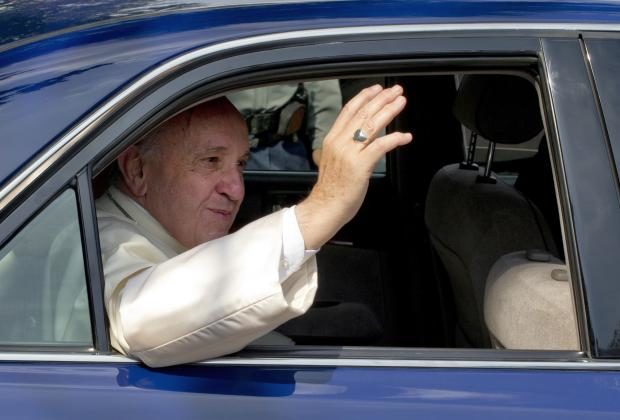
Pope Francis waves from the car as he travels Tuesday, Nov. 28, 2017, in Yangon, Myanmar. The Pope begins his first full day in Myanmar traveling to the capital to meet with the country’s leader Aung San Suu Kyi a day after a meeting the military general in charge of the crackdown on Rohingya Muslims. (Photo by GEMUNU AMARASINGHE / AP)
NAYPYITAW, Myanmar — Pope Francis traveled to Myanmar’s capital on Tuesday to meet with Nobel laureate Aung San Suu Kyi, who has come under increasing international criticism over a military crackdown on Rohingya Muslims that the UN and US have termed a campaign of “ethnic cleansing.”
Francis’ speech to Suu Kyi, other Myanmar officials and the diplomatic corps is the most anticipated of his visit, given the outcry over the operation which has sent more than 620,000 Rohingya fleeing into neighboring Bangladesh. The Rohingya, who have been denied citizenship and other basic rights for decades in Buddhist-majority Myanmar, have reported entire villages burned and looted, and women and girls raped.
Leaders of Myanmar’s Catholic Church have stressed that Suu Kyi, the country’s civilian leader, has no power to speak out against the military over the operation, and have urged continued support for her efforts to move Myanmar toward a more democratic future that includes all its religious minorities, Christians in particular.
How Francis bridges the local Catholic concerns with his legacy of speaking out for oppressed minorities will be key in his speech in Naypyitaw, the capital.
His address comes just hours after Suu Kyi was stripped of her latest honor in the West, a “Freedom of the City” award given to her by the Oxford City Council, which said anyone who turns a blind eye to violence tarnished its own reputation. Suu Kyi studied at Oxford before returning to Myanmar and being placed under detention for 15 years during the country’s long military dictatorship.
Before arriving in Naypyitaw, Francis met in Yangon with interfaith leaders at the archbishop’s residence, and separately with a prominent but controversial Buddhist leader.
The pope stressed a message of “unity in diversity” in his 40-minute meeting with Buddhist, Hindu, Muslim, Christian and Jewish leaders and told them they should work together to rebuild the country, Vatican spokesman Greg Burke said.
“If we argue, let’s argue like brothers, who quickly reconcile,” Francis said.
Francis’ meeting with Buddhist monk Sitagu Sayadaw was undertaken “in an effort to encourage peace and fraternal coexistence as the only way ahead,” Burke said.
Sitagu also met with Francis’s predecessor, Pope Benedict XVI, but has been criticized for using ethnic slurs against Muslims, particularly the Rohingya. He received an award presented by Suu Kyi earlier this year.
Francis dove into the Rohingya refugee crisis hours after arriving on Monday by meeting with the military chief responsible for the crackdown, Gen. Min Aung Hlaing, and three members of the bureau of special operations.
The Vatican didn’t provide details of the 15-minute “courtesy visit,” other than to say that “They spoke of the great responsibility of the authorities of the country in this moment of transition.”
Min Aung Hlaing’s office said in a statement on Facebook that he is willing to have “interfaith peace, unity and justice.” The general added that there was no religious or ethnic persecution or discrimination in Myanmar, and that the government allowed freedom of worship.
Rohingya Muslims have long faced state-supported discrimination and were stripped of citizenship in 1982, denying them almost all rights and rendering them stateless. They cannot travel freely, practice their religion, or work as teachers or doctors, and they have little access to medical care, food or education.
Myanmar’s Catholic Church has publicly urged Francis to avoid saying “Rohingya,” a term shunned by many here because the ethnic group is not a recognized minority in the country. And they have urged him to toe a delicate line in condemning the violence, given the potential for blowback against the tiny Catholic community.
Francis previously has prayed for “our Rohingya brothers and sisters,” lamented their suffering and called for them to enjoy full rights. As a result, much of the debate before his trip focused on whether he would again express solidarity with the Rohingya.
Any decision to avoid the term and shy away from the conflict could be viewed as a capitulation to the military and a stain on his legacy of standing up for the most oppressed and marginalized of society, no matter how impolitic.
Burke didn’t say if Francis used the term in his meeting with the general.
The papal trip was planned before the latest spasm of violence erupted in August, when Myanmar security forces responded to attacks by a militant Rohingya group with a scorched-earth campaign that sent many Rohingya fleeing to Bangladesh.
In the Kutupalong refugee camp in southern Bangladesh, Senu Ara, 35, welcomed Francis’ arrival for what he might be able to do for the refugees.
“He might help us get the peace that we are desperately searching for,” she said. “Even if we stay here he will make our situation better. If he decides to send us back, he will do so in a peaceful way.”
But in Myanmar, the sentiment was different. The government and most of the Buddhist majority consider the Rohingya Bengali migrants from Bangladesh living illegally in the country, though Rohingya have been here for generations.
“Being a religious leader – Catholic leader – means that he is well-regarded, but of course there is this worry if he says something, people might say, ‘OK, he just came to meddle’,” said Myanmar analyst Khin Zaw Win, a former political prisoner. “So, I think a lot of diplomacy is needed, in addition to the public relations.”